The Illinois Attorney General’s Public Access Counselor (PAC) issued a non-binding opinion that a city council violated the Open Meetings Act (OMA) by muting speakers during public comment at a meeting held through video conferencing. In reaching its opinion, the PAC found that the council impermissibly applied a rule against abusive language to impose an improper content-based restriction on public commenters in violation of First Amendment principles and the OMA.
Due to the COVID-19 pandemic, the city council at issue started holding meetings via video conference. The council allegedly interrupted and ultimately used the mute feature of the video conferencing software to silence several commenters during the public-comment portions of council meetings. The comments at issue included a rhetorical question about whether the city administrator had lied—which the city claimed was an abusive personal attack—and criticism toward and naming of city employees and officials. The council silenced the commenters in question under a council policy prohibiting abusive language. The commenters argued that the decision to mute them in these circumstances violated their rights to address a public body during public comment under the OMA.
On review, the PAC concluded that, by muting the public commenters in these circumstances, the council imposed impermissible content-based restrictions in violation of the OMA. The PAC acknowledged that a public body may impose rules regulating decorum during public comment, but such rules must tend to accommodate, rather than to unreasonably restrict, the right to address public officials.
Here, the PAC concluded that the council improperly muted the public commenters at issue. In reaching this conclusion, the PAC found that the commenters were calm while addressing the council, so it was not necessary to mute them to maintain decorum. Moreover, because the commenters criticized how public officials and public employees carried out their official duties, the PAC found that the speech at issue was on matters of public concern protected by the First Amendment. As a result, the council improperly applied its rule against abusive comments to the public commenters at issue, in violation of the OMA.
Although boards may establish rules to maintain decorum at public meetings, under the reasoning adopted by the PAC, such rules must meet a high bar, particularly regarding criticism of public employees and officials, and must be applied regardless of the content of their speech.
Source:

